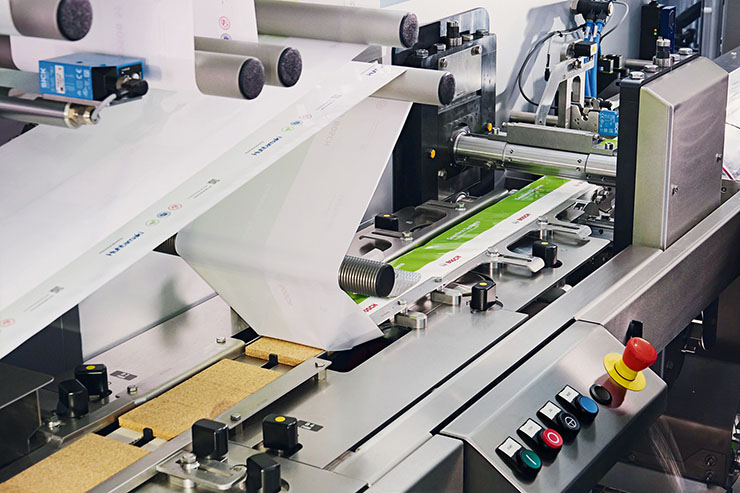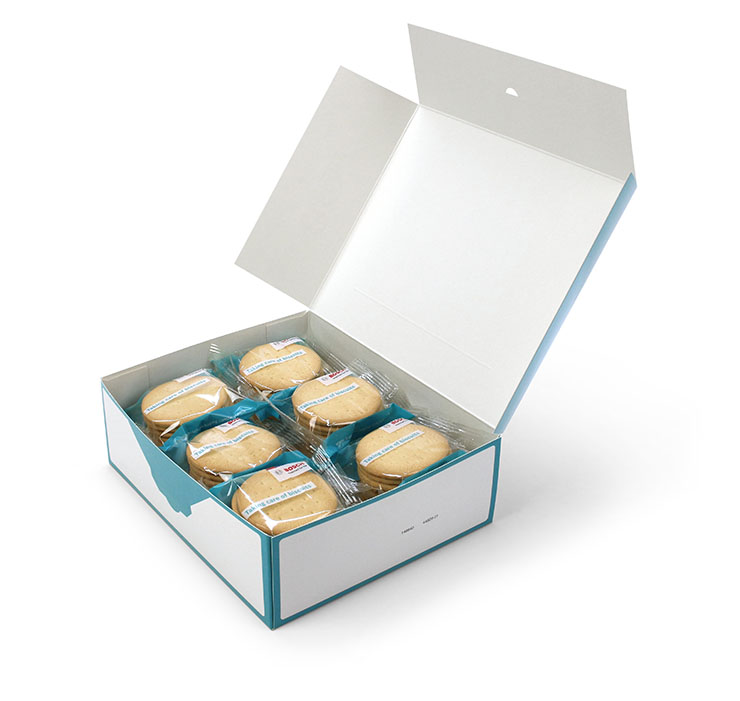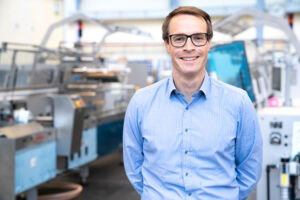
Biscuits, baked goods or pizza are commonly packaged in plastic flow wraps. When it comes to sustainability, however, there is room for improvement.
In the field of packaging, a number of approaches already balance the requirements of sustainability and product protection. Here, the main focus is the development of recyclable materials as well as waste avoidance.
Sustainability approach 1: waste prevention
At the production stage, the use of thinner films can reduce material consumption, thus minimizing waste. Using thinner films at constant processing speeds requires the packaging machines to be adjusted to the film properties. In general, film consumption can be reduced by optimally adjusting the roll width and take-off length. A further reduction in material use can be achieved by using narrower sealing seams. Even if this only involves a few millimeters of film per product pack, it can pay off in the long run and result in considerable savings. For example, reducing roll width and take-off length by two and five millimeters per pack, respectively, can result in material savings of over 130,000 square meters at an output rate of 200 packs per minute in 23-hour operation over a period of 50 weeks – equivalent to an area the size of 19 soccer fields. Alternatively, material savings can be achieved by changing pack styles, such as switching from twist wrap to flow wrap packaging. Similarly, the effectiveness of the packaging machines contributes to waste avoidance too; the greater the process stability, the fewer products are rejected.
Sustainability approach 2: recycling/recovery
Very few procedures are currently capable of separating and recycling composites. Furthermore, for health and safety reasons, the use of recycled materials for foodstuff is limited and is only permitted in certain cases, for example as a middle layer in composite films. For products that cannot be recycled, the last option in the waste hierarchy is thermal recovery. Current developments are moving towards alternative packaging materials that are fully recyclable: paper packaging and films made from mono-material.

Syntegon, formerly Bosch Packaging Technology, is continuously working on technical developments in order to process mono-material films and paper in the high-performance range
Bosch Packaging Technology is now Syntegon
Syntegon Technology is the new name among the market leaders in the processing and packaging industry. Known as Bosch Packaging Technology until late 2019, the former Bosch division today presented itself as an independent enterprise at the company headquarters in Waiblingen (Germany). Syntegon Technology’s business focus is on intelligent and sustainable technologies for the pharmaceutical and food industries. Extending the service range is a priority for the company. Syntegon Technology employs 6,100 people at more than 30 locations worldwide. It posted 1.3 billion euros in sales in 2019. Bosch disclosed its plans to sell the packaging machinery division to a newly incorporated entity managed by CVC Capital Partners, a leading private equity and investment advisory firm, in July 2019. The transaction was completed according to plan, with the company gaining full independence at the turn of the year.

Films made from mono-material
Since the different layers are made of the same type of plastic, mono-material films are fully recyclable. Cookies, crackers or bars are usually wrapped using polypropylene (PP). Depending on the packaging application, this can be either CPP (cast polypropylene) or OPP (oriented polypropylene).
The transition from composite to mono-material films is not straightforward. Mono-material imposes high demands on sealing technology, especially in the high output range. The sealing window is much smaller because the temperature-sensitive outer layer will be damaged if the sealing times are too long. At the same time, insufficient energy input results in inadequate sealing. With heat-resistant composites this is unproblematic; but in the case of heat-sensitive mono-materials this can easily lead to defective seals and damaged products.
In order to create the perfect seam using mono-material films at different film speeds and constant energy input, the three sealing parameters of pressure, temperature and time need to be coordinated optimally. What’s more, these technical challenges have to be mastered for a range of different mono-materials. This can only be achieved through the continuous development of sealing technologies in order to adjust the fin and cross sealing tools to the new conditions.
Paper as an alternative
Since paper is made from renewable raw materials as well as being recyclable and biodegradable, this material is very popular with manufacturers and consumers alike. The demand for flow wrappers made from paper as an alternative to plastics is currently increasing. Paper packaging also has the advantage that consumers can recognize the character of the paper from the way it looks and feels.
Horizontal flow wrapping machines use heat or cold sealing technologies. With paper packaging, heat sealing poses a significant challenge: paper is a good insulator. This means the material is not suitable for high output packaging, as sealing times have to be as short as possible. As a result, cold sealing is the common choice for high output quantities. This process ensures reliable seals without the application of heat. A very thin plastic barrier layer provides the necessary product protection. Despite this layer, the paper packaging can be recycled.
Whether paper or mono-material films are the right packaging material strongly depends on the product properties and the required seal integrity. For example, for sensitive products, such as cookies and other baked goods, mono-material film with heat sealing is recommended, unless the product itself is heat-sensitive. Every product and every process is different. For this reason, it is worth investigating all the parameters and conditions in detail to make sure the packaging solution takes brand targets, product protection and sustainability into account.

Author
Christoph Langohr, Syntegon Technology GmbH (formerly Bosch Packaging Technology), Project Manager Sustainability Horizontal Packaging, Email:[email protected]


